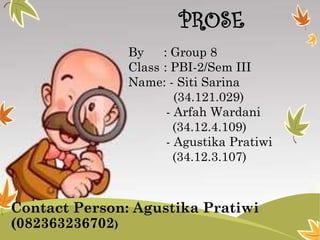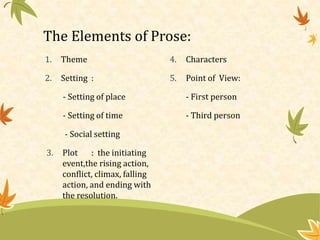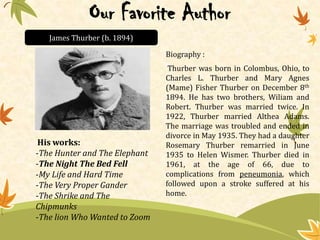Prose
- 1. PROSE By : Group 8 Class : PBI-2/Sem III Name: - Siti Sarina (34.121.029) - Arfah Wardani (34.12.4.109) - Agustika Pratiwi (34.12.3.107) Contact Person: Agustika Pratiwi (082363236702)
- 2. A. Definitions of Prose Prose comes from Latin word prosa, part of the phrase prosa oratio, meaning straightforward speech. Prose id expressions in direct style, without metre or rhyme and with no regular rhythm. Prose is writing distinguished from poetry by its greater variety of rhythm and its closer resemblance to the patterns of everyday speech. Prose is the ordinary form of spoken and written language whose unit is the sentence, rather than the line as it is in poetry. Prose is a form of language which applies ordinary grammatical structure and natural flow of speech rather than rhythmic structure.
- 3. The Elements of Prose: 1. Theme 4. Characters 2. Setting : 5. Point of View: - Setting of place - First person - Setting of time - Third person - Social setting 3. Plot : the initiating event,the rising action, conflict, climax, falling action, and ending with the resolution.
- 4. B. Kinds Of Prose 1. Fiction (Imagination) 1) Folktale a) Parable b) Fable c) Legend d) Fairy Tale e) Cumulative Tales f) Noodlehead Tales 2) Short Story 3) Novel 2. Non-Fiction (Real Fact ) 1) Diaries 2) Journal 3) Essays 4) Article 5) Biography and Autobiography 6) Literature Review
- 5. • James Joyce (b. 1882) C. The Authors 1. Tillie Olsen (b. 1913) 4. Alice Walker (b. 1944) 2. James Joyce (b. 1882) 5. Margaret Atwood (b.1939)
- 6. • James Joyce (b. 1882) The Authors 5. Eudora Welty (b. 1909) 7. Robert Beltran (b.1953) 6. James Thurber (b. 1894) 8. Anita Desai (b. 1937)
- 7. • James Joyce (b. 1882) The Authors 9. Raymond Carver (b. 1939) 10. Nathaniel Hawthorne (b. 1804)
- 8. Our Favorite Author James Thurber (b. 1894) Biography : His works: -The Hunter and The Elephant -The Night The Bed Fell -My Life and Hard Time -The Very Proper Gander -The Shrike and The Chipmunks -The lion Who Wanted to Zoom Thurber was born in Colombus, Ohio, to Charles L. Thurber and Mary Agnes (Mame) Fisher Thurber on December 8th 1894. He has two brothers, Wiliam and Robert. Thurber was married twice. In 1922, Thurber married Althea Adams. The marriage was troubled and ended in divorce in May 1935. They had a daughter Rosemary Thurber remarried in June 1935 to Helen Wismer. Thurber died in 1961, at the age of 66, due to complications from peneumonia, which followed upon a stroke suffered at his home.
- 9. Our Favorite James Thurber’s Prose The Night The Bed Fell
- 10. Conclusion • Theme : The theme of the story is that family is always there for each other. • Setting : - Setting place , In the narrator’s house in Colombus, Ohio - Setting of time, In the night -Social setting, The family always together when the other has a problem. • Plot : Father goes to sleep in attic, which has an already paranoid family, on the edge. (forward plot). • Characters : Grandfather, mother, father, writer, Briggs Beal, Herman, Rex, Aunt Melissa Beall, Aunt Sarah Shoaf, Aunt Gracie Shoaf. • Point of view: first person.










